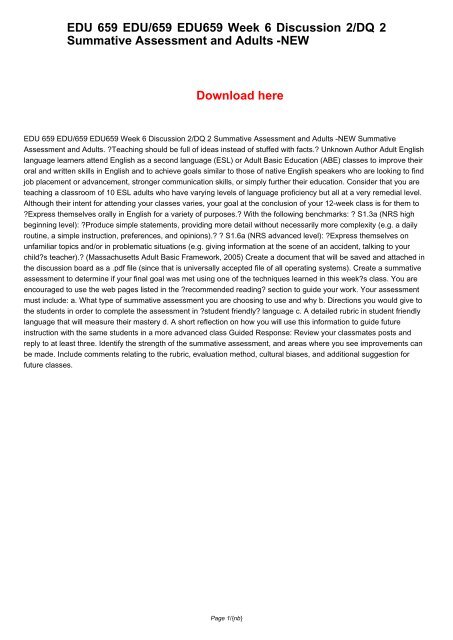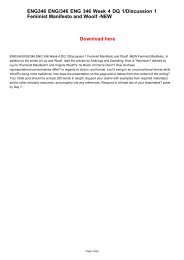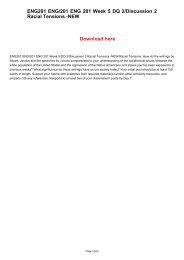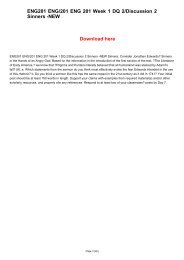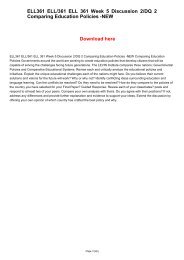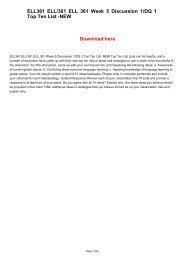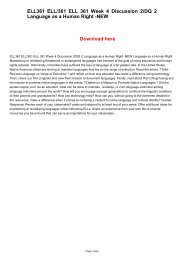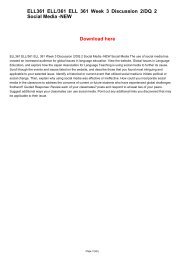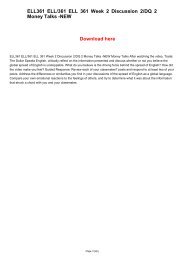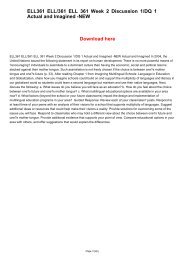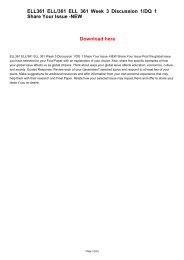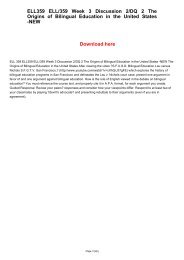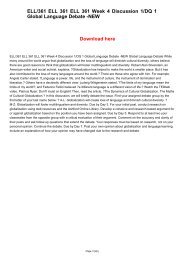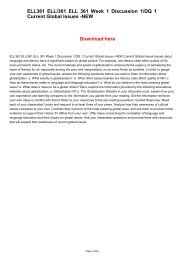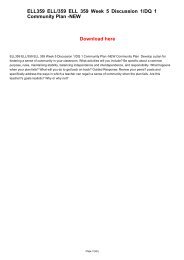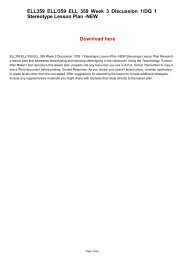EDU 659 EDU/659 EDU659 Week 6 Discussion 2/DQ 2 Summative Assessment and Adults -NEW
EDU 659 EDU/659 EDU659 Week 6 Discussion 2/DQ 2 Summative Assessment and Adults -NEW
EDU 659 EDU/659 EDU659 Week 6 Discussion 2/DQ 2 Summative Assessment and Adults -NEW
- TAGS
- summative
- assessment
Create successful ePaper yourself
Turn your PDF publications into a flip-book with our unique Google optimized e-Paper software.
<strong>EDU</strong> <strong>659</strong> <strong>EDU</strong>/<strong>659</strong> <strong>EDU</strong><strong>659</strong> <strong>Week</strong> 6 <strong>Discussion</strong> 2/<strong>DQ</strong> 2<br />
<strong>Summative</strong> <strong>Assessment</strong> <strong>and</strong> <strong>Adults</strong> -<strong>NEW</strong><br />
Download here<br />
<strong>EDU</strong> <strong>659</strong> <strong>EDU</strong>/<strong>659</strong> <strong>EDU</strong><strong>659</strong> <strong>Week</strong> 6 <strong>Discussion</strong> 2/<strong>DQ</strong> 2 <strong>Summative</strong> <strong>Assessment</strong> <strong>and</strong> <strong>Adults</strong> -<strong>NEW</strong> <strong>Summative</strong><br />
<strong>Assessment</strong> <strong>and</strong> <strong>Adults</strong>. ?Teaching should be full of ideas instead of stuffed with facts.? Unknown Author Adult English<br />
language learners attend English as a second language (ESL) or Adult Basic Education (ABE) classes to improve their<br />
oral <strong>and</strong> written skills in English <strong>and</strong> to achieve goals similar to those of native English speakers who are looking to find<br />
job placement or advancement, stronger communication skills, or simply further their education. Consider that you are<br />
teaching a classroom of 10 ESL adults who have varying levels of language proficiency but all at a very remedial level.<br />
Although their intent for attending your classes varies, your goal at the conclusion of your 12-week class is for them to<br />
?Express themselves orally in English for a variety of purposes.? With the following benchmarks: ? S1.3a (NRS high<br />
beginning level): ?Produce simple statements, providing more detail without necessarily more complexity (e.g. a daily<br />
routine, a simple instruction, preferences, <strong>and</strong> opinions).? ? S1.6a (NRS advanced level): ?Express themselves on<br />
unfamiliar topics <strong>and</strong>/or in problematic situations (e.g. giving information at the scene of an accident, talking to your<br />
child?s teacher).? (Massachusetts Adult Basic Framework, 2005) Create a document that will be saved <strong>and</strong> attached in<br />
the discussion board as a .pdf file (since that is universally accepted file of all operating systems). Create a summative<br />
assessment to determine if your final goal was met using one of the techniques learned in this week?s class. You are<br />
encouraged to use the web pages listed in the ?recommended reading? section to guide your work. Your assessment<br />
must include: a. What type of summative assessment you are choosing to use <strong>and</strong> why b. Directions you would give to<br />
the students in order to complete the assessment in ?student friendly? language c. A detailed rubric in student friendly<br />
language that will measure their mastery d. A short reflection on how you will use this information to guide future<br />
instruction with the same students in a more advanced class Guided Response: Review your classmates posts <strong>and</strong><br />
reply to at least three. Identify the strength of the summative assessment, <strong>and</strong> areas where you see improvements can<br />
be made. Include comments relating to the rubric, evaluation method, cultural biases, <strong>and</strong> additional suggestion for<br />
future classes.<br />
Page 1/{nb}


